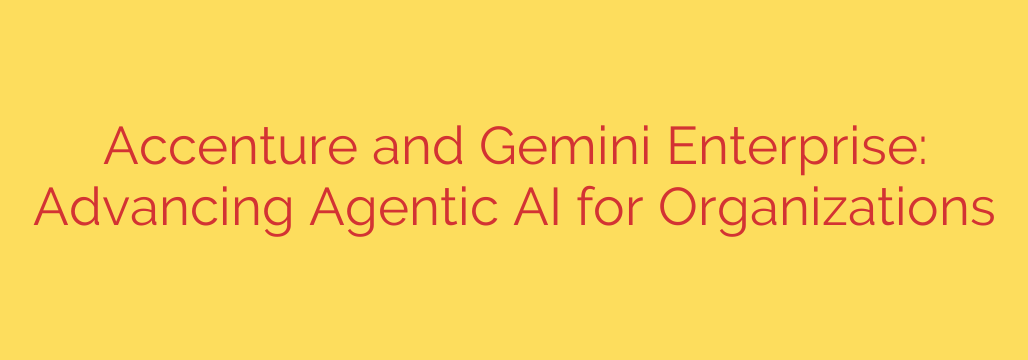
Beyond Automation: How Agentic AI is Redefining What’s Possible for Your Business
For the past few years, the conversation around artificial intelligence in the enterprise has been dominated by generative AI—powerful tools that can answer questions, write code, and generate creative content. While transformative, this is only the beginning. The next major leap is already here, and it’s moving AI from a passive assistant to an active participant in your business operations. This evolution is called agentic AI.
Unlike models that simply respond to prompts, AI agents are designed to understand a goal, create a plan, and take a series of autonomous actions to achieve it. They can reason, troubleshoot, and interact with various systems and applications to complete complex, multi-step tasks that once required significant human oversight. This shift represents a fundamental change from AI that assists to AI that achieves.
What Exactly is Agentic AI?
Think of the difference between a research assistant and a project manager. You can ask a research assistant (generative AI) to “find information on our top three competitors.” It will retrieve and summarize the data for you.
You can tell a project manager (agentic AI) to “launch a competitive analysis report by Friday.” This agent would then:
- Deconstruct the Goal: Identify the top three competitors.
- Plan the Steps: Access internal sales data, browse public financial reports, scan social media for sentiment, and check industry news sites.
- Execute the Plan: Interact with different software (CRM, web browsers, data analysis tools) to gather the information.
- Synthesize and Create: Analyze the collected data, generate insights, compile it into a structured report, and deliver the final document.
This ability to reason, plan, and execute autonomously is what sets agentic AI apart. It leverages powerful foundation models, like Google’s Gemini, to not only understand complex requests but also to navigate the digital tools necessary to see them through to completion.
Powering the Enterprise with Intelligent Agents
The successful deployment of this advanced technology requires more than just a powerful AI model. It demands deep industry knowledge, a robust and secure platform, and a clear strategy for implementation. This is why leading technology providers and global consulting firms are now collaborating to build specialized solutions and establish dedicated Centers of Excellence.
These initiatives are focused on a single goal: making agentic AI practical, scalable, and secure for large organizations. By training tens of thousands of developers on platforms like Google Cloud’s Vertex AI and the Gemini family of models, the groundwork is being laid to deploy sophisticated AI agents across every business function.
Real-World Applications: Where Agentic AI is Making an Impact
The potential applications are vast and transformative, moving beyond simple automation to intelligent operational management.
Marketing and Sales: An AI agent could be tasked with “increasing leads from the manufacturing sector by 15% this quarter.” It could then autonomously analyze market data, identify target companies, draft personalized outreach campaigns, execute them through email and social platforms, and track the results in the CRM—all while adjusting its strategy based on real-time performance.
Operations and Supply Chain: Instead of just flagging a potential supply chain disruption, an agentic AI could proactively resolve it. It could identify an alternative supplier, negotiate pricing within pre-approved limits, update the logistics schedule, and notify all relevant stakeholders without any human intervention.
Finance and Compliance: Consider the complex process of financial reconciliation. An AI agent can manage the entire workflow, from gathering data from disparate systems and identifying discrepancies to creating adjusting entries and generating final compliance reports, dramatically reducing manual effort and the risk of error.
Enhanced Customer Service: An AI agent can handle complex customer issues from end to end. If a customer reports a damaged delivery, the agent could access order history, process a refund or replacement, schedule a new shipment, and update the customer at every step, creating a seamless and efficient experience.
Actionable Steps: Preparing Your Organization for the Agentic AI Revolution
Harnessing the power of AI agents requires careful planning and a strategic approach. Waiting on the sidelines is not an option for those who want to maintain a competitive edge.
Identify High-Impact Use Cases: Start by identifying complex, multi-step processes within your organization that are rule-based but require interaction across multiple systems. These are prime candidates for early adoption.
Prioritize Data Governance and Quality: Agentic AI is only as effective as the data it can access. Ensure your data is clean, well-organized, and accessible. Establish clear governance policies to manage how AI agents interact with sensitive information.
Build a Foundation of Trust and Security: The autonomy of AI agents requires robust security protocols. Implement “human-in-the-loop” oversight for critical decisions, establish clear operational guardrails, and ensure all actions are logged and auditable to maintain control and accountability.
Invest in Talent and Upskilling: Your workforce will need to transition from doing the tasks to managing the AI agents that do the tasks. Invest in training programs that focus on AI literacy, strategic oversight, and prompt engineering to empower your team to work effectively alongside these new digital colleagues.
The era of agentic AI is not a distant future—it is actively being built and deployed today. By understanding its capabilities and preparing your organization strategically, you can move beyond simple automation and unlock a new level of productivity, innovation, and intelligent operation.
Source: https://www.helpnetsecurity.com/2025/10/10/accenture-google-cloud-agentic-ai/








